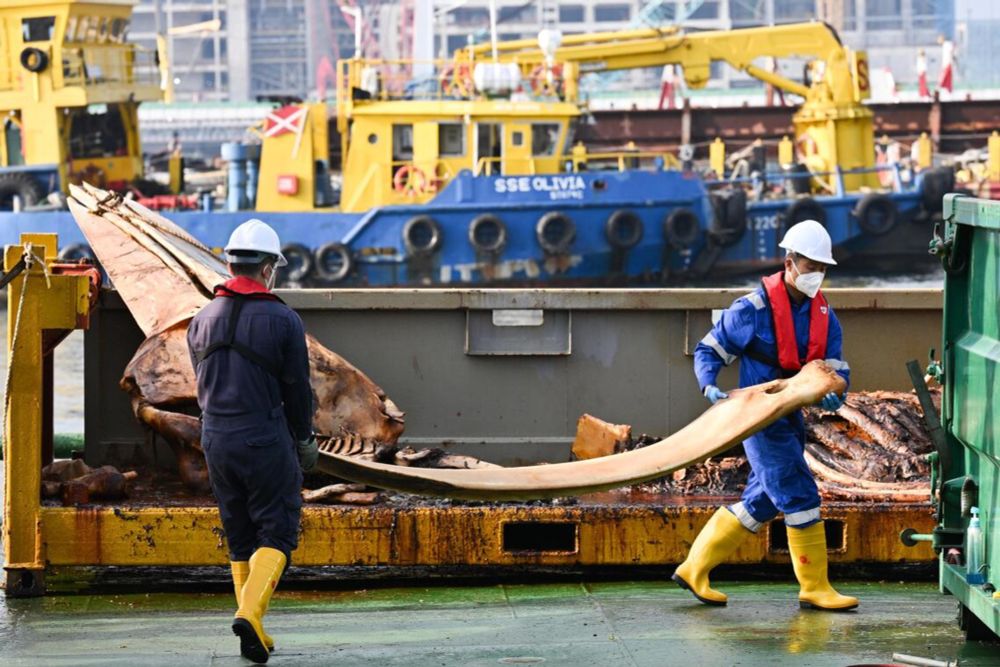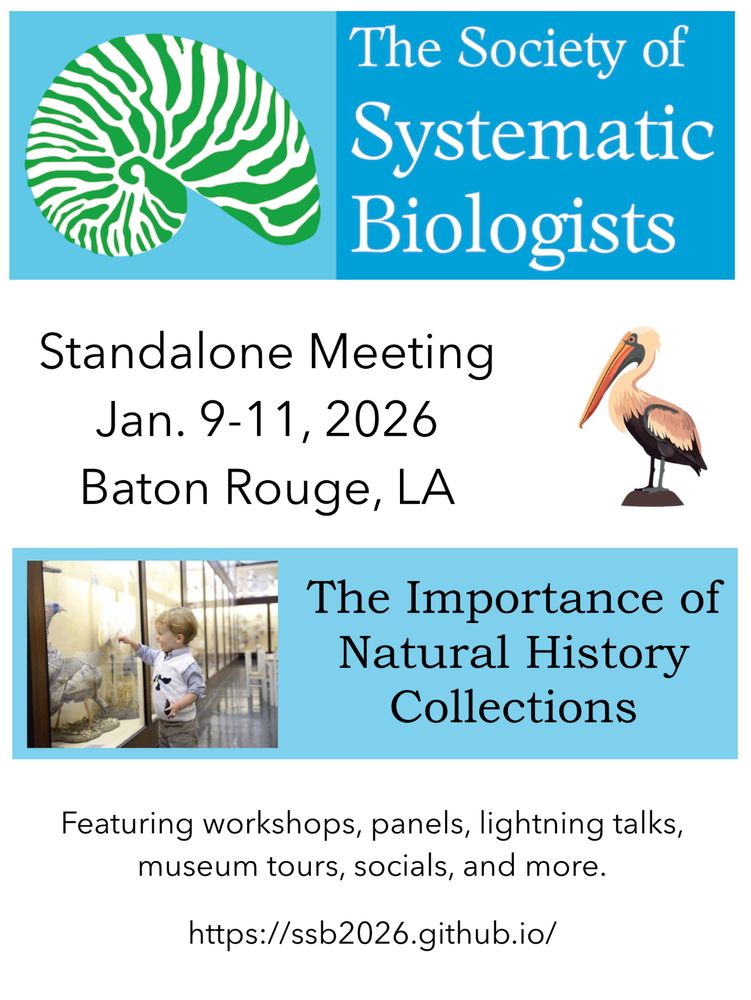
Yellow Wellington boots, one with split on the heel.
RIP boots: 2015–2025
I didn’t expect we’d be such close friends again, protecting me through two big whale defleshing ops.
@marcuschua.bsky.social
Studies and curates mammals of SE Asia. Biodiversity, conservation, and natural history museums. Also swims, hifi, and ramen. Same handle on the x-bird app. 🇸🇬 https://sites.google.com/view/marcuschua

Yellow Wellington boots, one with split on the heel.
RIP boots: 2015–2025
I didn’t expect we’d be such close friends again, protecting me through two big whale defleshing ops.


It’s been a month into the salvage of the roqual whale, with the days long and I’ve been onsite daily during workdays.
So touched by my colleagues showing concern about my wellbeing, feeding and hydration. Still don’t know who the snacks are from but thanks!

Also, practically smelling like rotting whale everyday. But so grateful for my LKCNHM colleagues who have shown up to help with this massively smelly and laborious process. Many weeks to go!
Thanks Ang Qing for the story about our salvage efforts (so far)!
www.straitstimes.com/singapore/en...

The salvage of this dead baleen whale has been the main preoccupation of my waking hours since the start of September.
www.straitstimes.com/singapore/en...



Back in Spain after two great weeks at the Lee Kong Chian and Thailand National Natural History Museums. Always a pleasure to catch up with friends, start new collabs and examine amazing specimens. Huge thanks to @marcuschua.bsky.social and the THNHM collections team for being such wonderful hosts!
19.09.2025 04:25 — 👍 3 🔁 1 💬 0 📌 0
The organizing committee created a fun photo booth with “Team Vert” and “Team Invert”—what a way to start a war!
06.09.2025 02:16 — 👍 0 🔁 0 💬 0 📌 0
The LKCNHM Public Research Symposium 2025 is underway!
My colleagues and I will be sharing about specimens, science and stories from the museum with members of the public, and I will be giving a talk and moderating a panel discussion.
Excited to share our science and research!

Key takeaway: While SE Asian small cats evolved to coexist, the introduced domestic cat creates a concerning niche overlap. This poses a new, understudied conservation threat to wild species, and more research on this impact is needed.
Full paper: doi.org/10.1038/s415...

Enter the introduced domestic cat. 🐈
Our analysis shows their skulls overlap significantly with SE Asian native species, especially female leopard cats and marbled cats. This creates a new, direct threat of competition for food and space.

For other cats, it's more complex. We found clear skull morphology overlap, suggesting competition for similar food.
Female Asian golden cats & male jungle cats have similar skulls, pointing to niche overlap.
But they seem to avoid competition by using different habitats.

Some cats are specialists. The fishing cat and flat-headed cat have highly distinct skulls, adapted for hunting fish. 🐟
This unique diet means they seldom compete with other native cats for food, occupying their own ecological niche.

Craniological differentiation amongst Southeast Asian small cats.
[New paper] How do 8 small wild cat species coexist in SE Asia? Do they avoid competition by carving out unique niches?
Our study analyzed 465 museum skulls to see how their anatomy helps them share the space. 🧵
doi.org/10.1038/s415...
/w @wildcru.bsky.social @ntlmuseumsscot.bsky.social



A story on the leopard cat in Singapore is featured in Our Wild Neighbours by Yap Seow Choong (in Chinese). Also honored to be featured as a wildlife researcher in it!
Available in bookstores and online stores.

Figure 3 from Towers et al. (2025) showing images of killer whales attempting to provision food items to humans.
We often hear of humans feeding wildlife, but occasionally the tables are turned!
Towers et al. reviews attempts by wild killer whales to provision people with food items.
Fish, a whole seal, and even seaweed!
I want to be fed by a killer whale!
dx.doi.org/10.1037/com0...

Seeking nature in Singapore: guided walks, talks, workshops, etc by nature groups are listed at sg60naturecalendar.wordpress.com
27.06.2025 23:32 — 👍 0 🔁 1 💬 0 📌 0
It’s been a memorable month:
Finally finished my mouse-deer dissertation and defense
Qualified for the World Aquatics Masters Championships in SG 2025
Mayhem in Singapore
Penang
Really grateful for everyone who was part of this.

More details coming soon, but mark your calendars ...
Breakout meeting for @systbiol.bsky.social The Society of Systematic Biologists - will be Jan 9-11 in Baton Rouge!
Topic is 'The Importance of Natural History Collections'
@jembrown.bsky.social is primary host/organizer
ssb2026.github.io

Figure from Han et al. (2025) preprint.
Super fascinating Han et al. (2025) found leopard cats occupied human settlements in China for 3,500 years before domestic cats in 600-900 CE.
Evidence include ancient DNA and this super cute 168 BC painting of a supposed leopard cat.
Also, a co-author's name is Miaomiao.
doi.org/10.1101/2025...

Before and after land reclamation satellite maps cobbled together by me with adapted leopard cat home range figures from Lee et al. (2025).
I thought it'll be a uniquely Singapore thing, but someone else found leopard cats on reclaimed land—in South Korea!
Lee et al. (2025) tracked leopard cats on grassland and rice fields but they seem to avoid areas of human use.
Adapted 🛰️ maps by me.
doi.org/10.1007/s133...
The top 10 flying insect clades rule the skies—but defy the rules. Weak or inverted latitudinal diversity gradients leave biogeographers puzzled. Entomologists? Mildly amused. www.biorxiv.org/content/10.1...
14.05.2025 15:52 — 👍 89 🔁 44 💬 1 📌 4
It’s the animal with the floofiest tail, the tufted ground squirrel (Rheithrosciurus macrotis)—found only on Borneo!
The grooved teeth is thought to act like a sawing surface to break down tough nuts, which are part of its diet.

Tap and zoom.
Whose teeth is this?

I’d like to thank this reviewer who completed their review of our manuscript in one day (!); even before the other invited reviewer responded.
[just hoping it wasn’t a negative one 🤣]
Also this tracking portal is like receiving an Amazon order.
Report carcass sightings to us here: lkcnhm.nus.edu.sg/our-research...
29.03.2025 10:54 — 👍 0 🔁 0 💬 0 📌 0
Thanks Raj for telling the story of what goes on after we pick up a dead animal for science or education at the natural history museum! Kudos to the roadkill network in Singapore too.
Watch out for the nerdy dad jokes.
www.channelnewsasia.com/today/visual...
Report carcass sightings to us here: lkcnhm.nus.edu.sg/our-research...
29.03.2025 10:52 — 👍 0 🔁 0 💬 0 📌 0
Previously, a white individual was recorded by Mannion et al. in Brunei.
doi.org/10.1515/mamm...

Photo by Hung Le
Looks like another albino or leucistic mouse-deer has been recorded, this time in Vu Quang National Park in Viet Nam.
From the looks and location, it is likely what we recognise as the lesser mouse-deer (Tragulus kanchil).
vnexpress.net/cheo-cheo-ba...
Thanks co-author!
14.03.2025 15:15 — 👍 1 🔁 0 💬 0 📌 0
Google reminded me about this 1k citation milestone today. Carried so hard by my co-authors here. Glad for all the opportunities to do science together and add to the knowledge of this world we live in.
scholar.google.com/citations?us...